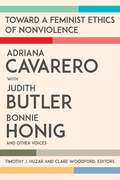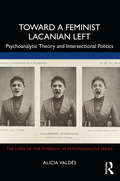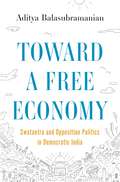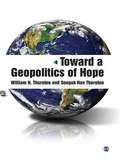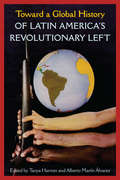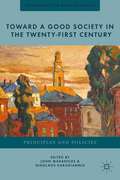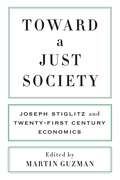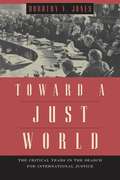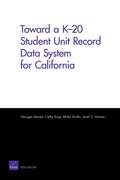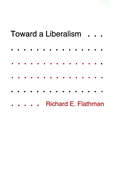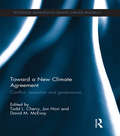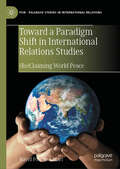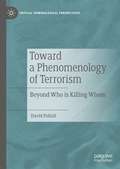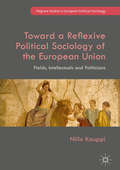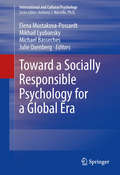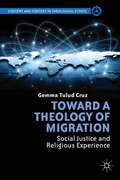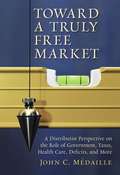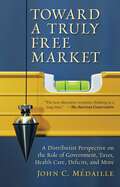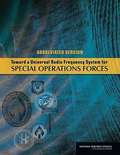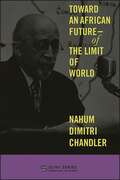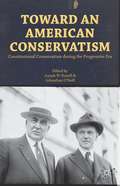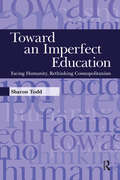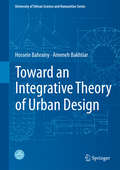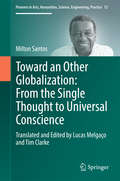- Table View
- List View
Toward a Feminist Ethics of Nonviolence
by Judith Butler Bonnie Honig Adriana CavareroToward a Feminist Ethics of Nonviolence brings together major feminist thinkers to debate Cavarero’s call for a postural ethics of nonviolence and a sociality rooted in bodily interdependence.Toward a Feminist Ethics of Nonviolence brings together three major feminist thinkers—Adriana Cavarero, Judith Butler, and Bonnie Honig—to debate Cavarero’s call for a postural ethics of nonviolence. The book consists of three longer essays by Cavarero, Butler, and Honig, followed by shorter responses by a range of scholars that widen the dialogue, drawing on post-Marxism, Italian feminism, queer theory, and lesbian and gay politics. Together, the authors contest the boundaries of their common project for a pluralistic, heterogeneous, but urgent feminist ethics of nonviolence.
Toward a Feminist Lacanian Left: Psychoanalytic Theory and Intersectional Politics
by Alicia ValdésWhile traditional feminist readings on antagonism have pivoted around the sole axis of sex and/or gender, a broader and intersectional approach to antagonism is much needed; this book offers an innovative, feminist, and discursive reading on the Lacanian concept of sexual position as a way to problematize the concepts of political antagonism and political subjects. Can Lacanian psychoanalysis offer new grounds for feminist politics? This discursive mediation of Lacan's work presents a new theoretical framework upon which to articulate proposals for intersectional political theory. The first part of this book develops the theoretical framework, and the second part applies it to the construction of woman’s identity in European politics and economy. It concludes with notes for a feminist political and economic praxis through community currencies and municipalism. The interdisciplinary approach of this book will appeal to scholars interested in the fields of psychoanalysis, feminisms, and political philosophy as well as multidisciplinary scholars interested in discourse theory, sexuality and gender studies, cultural studies, queer theory, and continental philosophy. Students at master's and PhD level will also find this a useful feminist introduction to Lacanian psychoanalysis, discourse, and gender.
Toward a Free Economy: Swatantra and Opposition Politics in Democratic India (Histories of Economic Life #44)
by Aditya BalasubramanianThe unknown history of economic conservatism in India after independenceNeoliberalism is routinely characterized as an antidemocratic, expert-driven project aimed at insulating markets from politics, devised in the North Atlantic and projected on the rest of the world. Revising this understanding, Toward a Free Economy shows how economic conservatism emerged and was disseminated in a postcolonial society consistent with the logic of democracy.Twelve years after the British left India, a Swatantra (“Freedom”) Party came to life. It encouraged Indians to break with the Indian National Congress Party, which spearheaded the anticolonial nationalist movement and now dominated Indian democracy. Rejecting Congress’s heavy-industrial developmental state and the accompanying rhetoric of socialism, Swatantra promised “free economy” through its project of opposition politics.As it circulated across various genres, “free economy” took on meanings that varied by region and language, caste and class, and won diverse advocates. These articulations, informed by but distinct from neoliberalism, came chiefly from communities in southern and western India as they embraced new forms of entrepreneurial activity. At their core, they connoted anticommunism, unfettered private economic activity, decentralized development, and the defense of private property.Opposition politics encompassed ideas and practice. Swatantra’s leaders imagined a conservative alternative to a progressive dominant party in a two-party system. They communicated ideas and mobilized people around such issues as inflation, taxation, and property. And they made creative use of India’s institutions to bring checks and balances to the political system.Democracy’s persistence in India is uncommon among postcolonial societies. By excavating a perspective of how Indians made and understood their own democracy and economy, Aditya Balasubramanian broadens our picture of neoliberalism, democracy, and the postcolonial world.
Toward a Geopolitics of Hope
by Songok Han Thornton William H ThorntonToward a Geopolitics of Hope posits a world order marked less by univocal "globalization" than by a grating geopolitics of rival capitalisms. Now that China, Russia, and much of the undemocratic developing world have embraced capitalism, this new Second World can no longer be regarded as a fleeting phenomenon. Globalization turns out to be anything but the steadfast ally of democratization it purports to be. Indeed, the Western democratic experiment of the last two centuries is starting to look very tentative and parochial. For this the West has nothing to blame but itself. In many respects the new Second World was spawned by First World neoliberal engagement. The Washington Consensus has not only brought the world to the brink of an intractable economic depression, but has played midwife to a chronic geopolitical crisis. Hope, however, is anything but defeatist in the face of this globalist impasse. It draws upon a host of non-Western reformisms--with special attention to those of India, Burma, and the Arab Spring--to forge a Global Third Way. Likewise its moral realism bridges the classic imperatives of Third World social justice and First World security. Its paramount goal is not just a new "soft power" politics, but a post-globalist geopolitics of hope.
Toward a Global History of Latin America’s Revolutionary Left
by Tanya Harmer and Alberto Martín ÁlvarezThis volume showcases new research on the global reach of Latin American revolutionary movements during the height of the Cold War, mapping out the region’s little-known connections with Africa, Asia, and Europe. Toward a Global History of Latin America’s Revolutionary Left offers insights into the effect of international collaboration on the identities, ideologies, strategies, and survival of organizers and groups.Featuring contributions from historians working in six different countries, this collection includes chapters on Cuba’s hosting of the 1966 Tricontinental Conference that brought revolutionary movements together; Czechoslovakian intelligence’s logistical support for revolutionaries; the Brazilian Left’s search for recognition in Cuba and China; the central role played by European publishing houses in disseminating news from Latin America; Italian support for Brazilian guerrilla insurgents; Spanish ties with Nicaragua’s revolution; and the solidarity of European networks with Guatemala’s Guerrilla Army of the Poor.Through its expansive geographical perspectives, this volume positions Latin America as a significant force on the international stage of the 1960s and 1970s. It sets a new research agenda that will guide future study on leftist movements, transnational networks, and Cold War history in the region. Contributor:s José Manuel Ágreda Portero | Van Gosse | James G. Hershberg | Gerardo Leibner | Blanca Mar León | Eduardo Rey Tristán | Arturo Taracena Arriola | Michal Zourek
Toward a Good Society in the Twenty-First Century
by John Marangos Nikolaos KaragiannisHaving previously defined a good society as a sustainable society with a high level of development, significant provision of meaningful jobs, and low levels of inequality and social ills, Toward a Good Society in the Twenty-first Century provides a wide range of principles and policies that would be necessary if we are to achieve a good society. Marangos and Karagiannis have put together a comprehensive volume that explores the principles and policies needed to bring about the good society, and focuses on four broad themes which are deemed important towards achieving a good or better society: quality education and fair distribution; environmentally sustainable prosperity; inclusive economic development and significant job creation; and beneficial civic institutions, and deepening of freedom and time use. All these topics can be highly controversial and call for alternative perspectives on theoretical (philosophical) and policy grounds.
Toward a Healthier Garden State: Beyond Cancer Clusters and COVID
by Michael R. Greenberg Dona SchneiderWhile New Jersey now frequently appears near the top in listings of America’s healthiest states, this has not always been the case. The fluctuations in the state’s overall levels of health have less to do with the lifestyle choices of individual residents and more to do with broader structural issues, ranging from pollution to urban design to the consolidation of the health care industry. This book uses the past fifty years of New Jersey history as a case study to illustrate just how much public policy decisions and other upstream factors can affect the health of a state’s citizens. It reveals how economic and racial disparities in health care were exacerbated by bad policies regarding everything from zoning to education to environmental regulation. The study further chronicles how New Jersey struggled to deal with public health crises like the AIDS epidemic and the crack epidemic. Yet it also explores how the state has developed some of the nation’s most innovative responses to public health challenges, and then provides policy suggestions for how we might build an even healthier New Jersey.
Toward a Just Society: Joseph Stiglitz and Twenty-First Century Economics
by Martin GuzmanJoseph Stiglitz is one of the world’s greatest economists. He has made fundamental contributions to economic theory in areas such as inequality, the implications of imperfect and asymmetric information, and competition, and he has been a major figure in policy making, a leading public intellectual, and a remarkably influential teacher and mentor. This collection of essays influenced by Stiglitz’s work celebrates his career as a scholar and teacher and his aspiration to put economic knowledge in the service of creating a fairer world.Toward a Just Society brings together a range of essays whose breadth reflects how Stiglitz has shaped modern economics. The contributions to this volume, all penned by high-profile authors who have been guided by or collaborated with Stiglitz over the last five decades, span microeconomics, macroeconomics, inequality, development, law and economics, and public policy. Touching on many of the central debates and discoveries of the field and providing insights on the directions that academic economics could take in the future, Toward a Just Society is an extraordinary celebration of the many paths Stiglitz has opened for economics, politics, and public life.
Toward a Just World: The Critical Years in the Search for International Justice
by Dorothy V. Jones"Toward a Just World is an insightful and thoughtful history. The first half of the twentieth century and the heroic efforts of those who sought international justice during that time will be much better understood and appreciated thanks to this fascinating book. "—Robert F. Drinan, Georgetown University A century ago, there was no such thing as international justice, and until recently, the idea of permanent international courts and formal war crimes tribunals would have been almost unthinkable. Yet now we depend on institutions such as these to air and punish crimes against humanity, as we have seen in the International Criminal Tribunal for Rwanda and the appearance of Serbian leader Slobodan Milosevic before the Tribunal for the Former Yugoslavia. Toward a Just World tells the remarkable story of the long struggle to craft the concept of international justice that we have today. Dorothy V. Jones focuses on the first half of the twentieth century, the pivotal years in which justice took on expanded meaning in conjunction with ideas like world peace, human rights, and international law. Fashioning both political and legal history into a compelling narrative, Jones recovers little-known events from undeserved obscurity and helps us see with new eyes the pivotal ones that we think we know. Jones also covers many of the milestones in the history of diplomacy, from the Treaty of Versailles and the creation of the League of Nations to the Nuremberg war crimes tribunal and the making of the United Nations. As newspapers continue to fill their front pages with stories about how to administer justice to al Qaeda and Saddam Hussein, Toward a Just World will serve as a timely reminder of how the twentieth century achieved one of its most enduring triumphs: giving justice an international meaning.
Toward a K-20 Student Unit Record Data System for California
by Georges Vernez Janet S. Hansen Mirka Vuollo Cathy KropTo improve the progression of students through the educational system and to improve education quality, California needs a robust data system that can track an individual student's progress from kindergarten to college and beyond. The authors review California's multiple existing student data systems and identify steps that could be taken toward building and maintaining an integrated student data system for the state.
Toward a Liberalism
by Richard FlathmanIn Toward a Liberalism, Richard Flathman shows why and how political theory can contribute to the quality of moral and political practice without violating, as empiricist- and idealist-based theories tend to do, liberal commitments to individuality and plurality. Exploring the tense but inevitable relationship between liberalism and authority, he advances a theory of democratic citizenship tempered by appreciation of the ways in which citizenship is implicated with and augments authority. Flathman examines the relationship of individual rights to freedom on one hand and to authority and power on the other, rejecting the quest for a single homogenous and authoritative liberal theory.
Toward a New Climate Agreement: Conflict, Resolution and Governance (Routledge Advances in Climate Change Research)
by Jon Hovi David M. McEvoy Todd L. CherryClimate change is one of the most pressing problems facing the global community. Although most states agree that climate change is occurring and is at least partly the result of humans’ reliance on fossil fuels, managing a changing global climate is a formidable challenge. Underlying this challenge is the fact that states are sovereign, governed by their own laws and regulations. Sovereignty requires that states address global problems such as climate change on a voluntary basis, by negotiating international agreements. Despite a consensus on the need for global action, many questions remain concerning how a meaningful international climate agreement can be realized. This book brings together leading experts to speak to such questions and to offer promising ideas for the path toward a new climate agreement. Organized in three main parts, it examines the potential for meaningful climate cooperation. Part 1 explores sources of conflict that lead to barriers to an effective climate agreement. Part 2 investigates how different processes influence states’ prospects of resolving their differences and of reaching a climate agreement that is more effective than the current Kyoto Protocol. Finally, part 3 focuses on governance issues, including lessons learned from existing institutional structures. The book is unique in that it brings together the voices of experts from many disciplines, such as economics, political science, international law, and natural science. The authors are academics, practitioners, consultants and advisors. Contributions draw on a variety of methods, and include both theoretical and empirical studies. The book should be of interest to scholars and graduate students in the fields of economics, political science, environmental law, natural resources, earth sciences, sustainability, and many others. It is directly relevant for policy makers, stakeholders and climate change negotiators, offering insights into the role of uncertainty, fairness, policy linkage, burden sharing and alternative institutional designs.
Toward a Paradigm Shift in International Relations Studies: (Re)Claiming World Peace (Palgrave Studies in International Relations)
by Navid PourmokhtariThis book asks why the current IR paradigm has outlasted its utility and argues that despite changes to world politics, the paradigm of IR remains far more preoccupied with the dynamics of war and almost silent, when it comes to commenting on the conditions of lasting, global peace. Cognizant of the dominant paradigm’s supposed preoccupation with seeking peace, the author shows how IR’s mainstream discourses work to reproduce war.
Toward a Phenomenology of Terrorism: Beyond Who is Killing Whom (Critical Criminological Perspectives)
by David PolizziThis book examines the socio-psychological dynamics and drivers of terrorism from a humanistic perspective. Most interpret terrorism as meaningless, asocial violence but this book argues that it's not just a case of seeing 'who is killing whom' but that defining and understanding terrorism is configured by historical context and immediate experience. The author argues that these acts of terrorist violence can be interpreted as the external expression of repressed feelings and impulses that have been tabooized by mainstream society. Upon release, these terrorists gain a new 'nomos' which generates a sense of meaning and significance for them. This book draws on psycho-analytical theories of repression, Heideggerian existentialism, Berger’s anthropological concept of culture as ‘nomos’, and Roger Griffin’s analysis of terrorist fanaticism, adding to the understanding terrorism and criminality from a new perspective and beyond the usual literature situated in political science, security/war and peace studies. This book seeks to provide: a definition of terrorism, an account of the psychological theory, an explanation of the nomic dimension of terroristic violence, an exploration of the relevance of the new approach to understanding: Salafi jihadism, Al-Qaeda, Islamic State, the Taliban, White Supremacism, the rise of the Radical Right, and reflections on this for combating terrorism. It appeals to those interested in terrorism, conflict, terrorist radicalization and motivation, international relations, politics and religious politics, and to counter-terrorism agencies.
Toward a Reflexive Political Sociology of the European Union
by Niilo KauppiThis book argues that contemporary European politics creates new forms of transnational power that challenge the traditional parameters of the nation-state. Kauppi identifies and critically explores the evolving dynamics between national and transnational spaces, groups and knowledge, and suggests that European public policies and transnational institutions like the European Parliament create new spaces, types of knowledge and novel political practices. Toward a Reflexive Political Sociology of the European Union is structured around three parts. The first focuses on evolving transnational fields. The second explores the changing role of academics and universities. The third section engages with the works of Pierre Bourdieu on politics and the media. The issues discussed throughout the book revolve around the challenges to the nation-state and of knowledge production that is tied to it. This book will be an invaluable resource to academics and researchers interested in European politics, European Union studies and political sociology.
Toward a Socially Responsible Psychology for a Global Era
by Elena Mustakova-Possardt Mikhail Lyubansky Michael Basseches Julie OxenbergThis book explores the concept of "socially-responsible psychology in a global age" and how it might be used to organize, integrate and bring enhanced focus a field that has the potential to contribute to solutions to the world's most pressing problems. In this volume, the editors explore the central and defining features of socially-responsible psychology, challenges that this work would face, and the mechanisms and processes by which psychological work could be synergistically integrated with the work of other disciplines. For this purpose, the volume also examines a variety of factors currently that limit psychology in carrying out this goal.
Toward a Theology of Migration
by Gemma Tulud CruzAt no other time in the history of the world is the movement of people at such a large scale that scholars consider the current period as the age of migration. Beyond the density, velocity, and multi-directionality, however, the often conflicting and tragic nature of contemporary global migration makes a compelling case for theological reflection. The book explores the problems and possibilities that the experience of migrants brings to Christian theology by reflecting on the religious dimension as well as the social justice implications of the migrant experience. More specifically, the book reflects on the Christian vision of 'one bread, one body, one people' in view of the gifts and challenges of contemporary global migration to Christian systematic theology, social ethics, spirituality, mission, ministry, and inculturation based on the experience of refugees, unauthorized poor migrants, migrant workers, and migrant women.
Toward a Truly Free Market: A Distributist Perspective on the Role of Government, Taxes, Health Care, Deficits, and More
by John C. MedailleToward a Truly Free Market argues that any attempt to divorce economic equilibrium from economic equity will lead to an unbalanced economy--one that falls either to ruin or to ruinous government attempts to redress the balance.
Toward a Truly Free Market: A Distributist Perspective on the Role of Government, Taxes, Health Care, Deficits, and More
by John MedailleTaking "free markets" from rhetoric to reality For three decades free-market leaders have tried to reverse longstanding Keynesian economic policies, but have only produced larger government, greater debt, and more centralized economic power. So how can we achieve a truly free-market system, especially at this historical moment when capitalism seems to be in crisis? The answer, says John C. Medaille, is to stop pretending that economics is something on the order of the physical sciences; it must be a humane science, taking into account crucial social contexts. Toward a Truly Free Market argues that any attempt to divorce economic equilibrium from economic equity will lead to an unbalanced economy—one that falls either to ruin or to ruinous government attempts to redress the balance. Medaille makes a refreshingly clear case for the economic theory—and practice—known as distributism. Unlike many of his fellow distributists, who argue primarily from moral terms, Medaille enters the economic debate on purely economic terms. Toward a Truly Free Market shows exactly how to end the bailouts, reduce government budgets, reform the tax code, fix the health-care system, and much more.
Toward a Universal Radio Frequency System for Special Operations Forces
by National Research Council of the National AcademiesThe U.S. Special Operations Command (SOCOM) was formed in response to the failed rescue attempt in 1980 of American hostages held by Iran. Among its key responsibilities, SOCOM plans and synchronizes operations against terrorist networks. Special operations forces (SOF) often operate alone in austere environments with only the items they can carry, which makes equipment size, weight, and power needs especially important. Specialized radios and supporting equipment must be carried by the teams for their radio-frequency (RF) operations. As warfighting demands on SOCOM have intensified, SOCOM's needs for significantly improved radio-frequency (RF) systems have increased. Toward a Universal Radio Frequency System for Special Operations Forces examines the current state of the art for both handheld and manpackable platform-mounted RF systems, and determines which frequencies could be provided by handheld systems. The book also explores whether or not a system that fulfills SOF's unique requirements could be deployed in a reasonable time period. Several recommendations are included to address these and other issues.
Toward an African Future—Of the Limit of World (SUNY series, Literature... in Theory)
by Nahum Dimitri ChandlerExamines the thought of W. E. B. Du Bois, with attention to its potential for reorienting present-day critical theory and political philosophy.Widely known for his probing analysis of W. E. B. Du Bois's early work, in this book Nahum Dimitri Chandler references writing from across the whole of Du Bois's long career, while bringing sharp focus on two later texts issued in the immediate aftermath of World War II-Color and Democracy: Colonies and Peace and The World and Africa: An Inquiry into the Part which Africa Has Played in World History. In these texts, "the problem of the color line," which Du Bois had already characterized as the problem not only of the twentieth century, but of the modern epoch as a whole, is further figured as a global problem, as a horizon linking the contemporary conjuncture of the history of modern systems of enslavement with the ongoing impact of modern colonialism and imperialism on the world's possible futures. On this line of thought, Chandler proposes that the name of "Africa" is a theoretical metaphor that enables a hyperbolic re-narrativization of modern historicity. Du Bois thus emerges as an exemplary thinker of history and hope for the world beyond the limit of the present.
Toward an American Conservatism: Constitutional Conservatism during the Progressive Era
by Joseph Postell Johnathan O’neilDuring the Progressive Era (1880-1920), leading thinkers and politicians transformed American politics. Historians and political scientists have given a great deal of attention to the progressives who effected this transformation. Yet relatively little is known about the conservatives who opposed these progressive innovations, despite the fact that they played a major role in the debates and outcomes of this period of American history. These early conservatives represent a now-forgotten source of inspiration for modern American conservatism. This volume gives these constitutional conservatives their first full explanation and demonstrates their ongoing relevance to contemporary American conservatism.
Toward an Imperfect Education: Facing Humanity, Rethinking Cosmopolitanism (Interventions: Education, Philosophy, And Culture Ser.)
by Sharon ToddThe theory of cosmopolitanism is built on a paradoxical commitment to a universal idea of humanity and to a respect for human pluralism. Toward an Imperfect Education critiques the assumed "goodness" of humans that underwrites the idea of humanity and explores how antagonistic human interactions such as conflict, violence, and suffering are a fundamental aspect of life in a pluralistic world. This book proposes that the inescapable difference between humans compels our ethical and political observations in education. Todd persuasively argues that facing humanity in all its complexity and imperfection ought to be a central element of the cosmopolitan project to create a more just and humane education. Informed primarily by poststructural philosophy and feminist theory, she focuses on how sexual, cultural, and religious difference intersect with universal claims made in the name of humanity. Individual chapters develop a novel framework for dealing with antagonism in relation to human rights, democracy, citizenship, and cross-cultural understanding.
Toward an Integrative Theory of Urban Design
by Hossein Bahrainy Ameneh BakhtiarThis book takes a bold epistemological approach to address the fundamental questions that urban design has faced since its inception - questions concerning its legitimacy, definition, nature, content, purpose, theory, methods, jurisdiction and above all its knowledge base. The appropriate level of urban design - global or local - is another critical and emerging question discussed. At the end, an integrative theory of urban design is introduced, on the basis of which a set of principles is developed for application by practicing urban designers. These principles are presented at three essential levels: general, global and local-Iranian. Toward an Integrative Theory of Urban Design is intended to dispel many of the ambiguities still troubling urban design as a discipline and profession.
Toward an Other Globalization: From the Single Thought to Universal Conscience
by Milton SantosThis book presents an alternative theory of globalization that derives not from the dominant perspective of the West, from which this process emerged, but from the critical vantage point of the Third World, which has borne the heaviest burdens of globalization. It offers a critical and uniquely first-hand perspective that is lacking not only from the apologists of Western hegemony, but from most scholars writing against this hegemony from within the globalizing world. Renowned throughout Latin America and parts of Europe, the author, Brazilian geographer Milton Santos, has long been for the most part inaccessible to the English-speaking world. Only one of his books, The Shared Space: The Two Circuits of the Urban Economy in Underdeveloped Countries, published in 1975, has been translated into English; nevertheless, the works of Santos's most important phase, from the 1980s until his death in 2001, have remained unavailable to English readers. With the translation of Toward an Other Globalization, one of the last works published in Santos's lifetime, this situation has finally been rectified. In this book, Santos argues that we must consider globalization in three different senses: globalization as a fable (the world as globalizing agents make us believe), as perversity (the world as it is presently, in the throes of globalization), and as possibility (the world as it could be). What emerges from the analysis of these three senses is an alternative theory of globalization rooted in the perspective of the so-called Global South. Santos concludes his text with a message that is optimistic, but in no way naïve. What he offers instead is a revolutionary optimism and, indeed, an other globalization.
